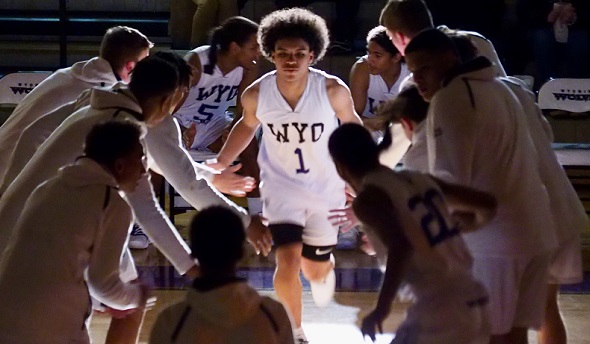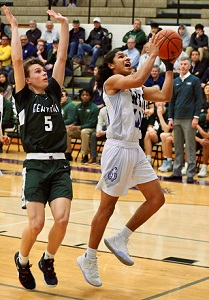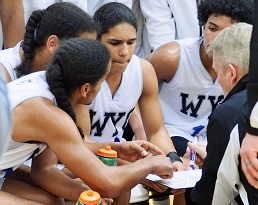
Detroit 'Longtime' Boys Coaches Down to Few
By
Tom Markowski
Special for Second Half
December 14, 2016
Gary Fralick considers himself one of the fortunate ones.
 Fralick, 66, is in his 32nd season as a head boys basketball coach. He retired from his teaching position in 2013. He started coaching at Redford Thurston in 1979, went to Royal Oak Kimball in 1984 and is in 23rd season as the head coach at Troy.
Fralick, 66, is in his 32nd season as a head boys basketball coach. He retired from his teaching position in 2013. He started coaching at Redford Thurston in 1979, went to Royal Oak Kimball in 1984 and is in 23rd season as the head coach at Troy.
Fralick might be lucky, but he is unquestionably rare. Fralick is believed to be one of three coaches in the Macomb/Oakland/Wayne area who has coached for more than 30 seasons.
There’s Dan Fife at Clarkston and Kevin Voss of Clinton Township Chippewa Valley, both of whom in their 35th seasons, all at the same school.
Another, Greg Esler at Warren DeLaSalle, is in his 30th season. He was the head coach at St. Clair Shores Lake Shore for seven seasons before going to DeLaSalle in 1994.
“We’re part of a dying breed,” Voss said.
It certainly appears so. Coaching longevity has taken on a different meaning recently. Twenty seems like a lot in these times, and in reality it is a long time. Twenty years or so ago, 20 years was normal. There’s a new normal, and 20 or 25 years isn’t it.
Many factors have contributed to this change. A person’s personal and family life often don’t coincide with the demands of coaching basketball. The responsibilities that come with coaching have increased. Some coaches say that to be an effective coach, it can be a 10- or 11-month job.
Two factors are at the forefront, and they are both financial. Coaches used to be educators as well as coaches. Yes, coaching can be viewed as teaching on the court, but at one time teaching in a classroom and coaching used to go hand in hand.
 Then there’s the subsidy coaches receive. It varies from school district to school district. Some make $4,000 a season, others can make $7,000. And it also costs money to run a program; unless the coach receives financial help from a booster club or parents, the money he or she receives begins to dwindle.
Then there’s the subsidy coaches receive. It varies from school district to school district. Some make $4,000 a season, others can make $7,000. And it also costs money to run a program; unless the coach receives financial help from a booster club or parents, the money he or she receives begins to dwindle.
But the most important factor is time.
“A tremendous amount of time is devoted to watching DVD or tapes,” Fralick said. “I know I’m dating myself with saying that. The point is, you’re watching a lot. There’s more scouting. And you don’t get paid much. Why don’t they stay as long as they used to? They get burned out. They want to spend more time with their families.
“You don’t see as many of the young coaches stay. Coaches don’t have the ambition to coach a long time. It’s not a profitable job. I don’t know what other coaches make. We used to compare what we made. Not anymore.
“Thirty years or more? I don’t see it happening. There’s the dual job thing. Things have changed. To me, it’s been a great job.”
To compensate for being away from home, Fralick brought his family with him. Sort of. He coached his son Gary, Jr., and Tim. Gary, a 1996 Troy graduate, played for his father his junior and senior seasons and Tim, a 1999 graduate, played four seasons on varsity. Fralick said he was even more fortunate to coach both on the same team (during the 1995-96 season).
Then there’s his wife, Sharon, who remains the scorekeeper.
“I’ve always had a passion for coaching and teaching,” Fralick said. “I love the game of basketball. I love the kids. There’s never a dull moment. It’s been a great ride.”
Vito Jordan has been around basketball all of his life. His father, Venias Jordan, was the boys head varsity coach at Detroit Mackenzie and Detroit Mumford before stepping down as a head coach only to return to the bench assisting his son the last six seasons.
Vito Jordan, 31, became a head coach at Detroit Osborn when he was 24. He started his coaching career the year before as an assistant to Henry Washington at Macomb College. Jordan went to Detroit Community after one season at Osborn and guided Community to its only MHSAA Finals appearance (Class B, 2013). He’s now in his fourth season as the head coach at Detroit Renaissance.
“I followed my father all of my life,” Jordan said. “I knew what I wanted to do when I was in college (Alma College). This is what I want to do the rest of my life.”
It’s different in Detroit. Schools close. Job titles change. Jordan, for instance, teaches at the Academy of Warren, a middle school in Detroit. It’s a charter school, not within the Detroit Public School system, therefore he receives his pay from two separate school systems (Renaissance is in the DPS).
There is a distinction. In some school systems coaches will receive a percentage – let’s say for argument sake, 10 percent – of their teaching salary to coach. Let’s say a person makes $60,000 a year to teach. He or she would then receive $6,000 to coach. If you coach two sports, that’s $12,000.
 Jordan is not privy to such a contract. Each job is separate. Jordan loves to coach, and he understands he must be a teacher to earn a decent living, and he’s content to continue on the path he is following. But he also knows that to make a good salary just coaching one must move on to the collegiate level like others have done.
Jordan is not privy to such a contract. Each job is separate. Jordan loves to coach, and he understands he must be a teacher to earn a decent living, and he’s content to continue on the path he is following. But he also knows that to make a good salary just coaching one must move on to the collegiate level like others have done.
“When there were coaches like my dad, Perry Watson (Detroit Southwestern), Johnny Goston (Detroit Pershing) and others, they all worked in the (Detroit Public) school system. Everyone was teaching. That was your career. None of them had aspirations of being a college coach. Not even Watson. Now everyone isn’t in the teaching profession. Maybe they do have a degree and maybe they don’t. The point is, most aren’t teachers. I can count on one hand those (in Detroit) who have their teaching certificate and coach.”
Jordan noted such successful PSL coaches like Derrick McDowell, Steve Hall and Robert Murphy who left high school to pursue a coaching career in college. Murphy guided Detroit Crockett to the Class B title in 2001 and is now the head coach at Eastern Michigan. McDowell has had two stints as a collegiate assistant coach, most recently at EMU. He’s since returned to coach at Detroit Western. Hall coached Detroit Rogers to three consecutive Class D titles (2003-05) before going to Duquesne University and Youngstown State as an assistant coach. Hall returned to Detroit last season and is in his second season as head coach at Detroit Cass Tech.
Jordan said they left high school to challenge themselves professionally, among other considerations. Voss said there are variables that influence how long a person lasts, in one school district or in coaching in general, that didn’t exist 20 years ago.
“Athletics have become pervasive in high school,” he said. “The whole booster situation you find in college is here. You can be winning but not winning enough. It’s a trickle down affect.
“Coaches complain about parents. Parents complain about playing time. High school sports is not as pure as it once was. Winning is way more important now. Now a coach comes in with a three-year window. You can have one or two down years, and the third you’d better win.
“Then there’s the pressure on your family. I’ve been lucky. My wife and I have had the players over for team dinners. We create a family atmosphere. It’s a change of society. I don’t envy the young coaches coming in.”
Community involvement has always been a priority for Voss. To keep a hand on the pulse, Voss heads the elementary basketball program within the Chippewa Valley school district. Games are held on Saturdays, and approximately 750 students take part.
“You have to have the right fit,” he said. “I’m in the right spot. You coach for different reasons when you get older. I’m enjoying the game. There’s a different level of satisfaction.”
 Tom Markowski is a columnist and directs website coverage for the State Champs! Sports Network. He previously covered primarily high school sports for the The Detroit News from 1984-2014, focusing on the Detroit area and contributing to statewide coverage of football and basketball. Contact him at [email protected] with story ideas for Oakland, Macomb and Wayne counties.
Tom Markowski is a columnist and directs website coverage for the State Champs! Sports Network. He previously covered primarily high school sports for the The Detroit News from 1984-2014, focusing on the Detroit area and contributing to statewide coverage of football and basketball. Contact him at [email protected] with story ideas for Oakland, Macomb and Wayne counties.
PHOTOS: (Top) Troy boys basketball coach Gary Fralick, left, is in his 32nd season coaching. (Middle) Detroit Renaissance boys coach Vito Jordan is following in the coaching footsteps of his father, Venias. (Below) Chippewa Valley boys coach Kevin Voss, left, is in his 35th season at his school. (Top and below photos courtesy of C&G Newspapers; middle photo courtesy of Detroit Public School League.)

Veteran Wyoming Wins Way Into Spotlight
February 20, 2020
By Dean Holzwarth
Special for Second Half
WYOMING – Wyoming boys basketball coach Thom Vander Klay isn’t as worried as most coaches when his team is involved in a tightly-contested game late in the fourth quarter.
 The senior-dominated and seasoned Wolves typically find a way to come out on top.
The senior-dominated and seasoned Wolves typically find a way to come out on top.
“We’re just kind of gritty, and we don’t get rattled,” the longtime coach said of his 15-1 squad. “We keep plugging away and taking our swings. It’s one of those teams where they are not afraid to lose and so I don’t think you will find moments that are too big, because that’s not really on the agenda. They are fearless in that regard.”
Wyoming is arguably the best team in the Grand Rapids area and proved it during the last week with a pair of key wins over ranked opponents.
The Wolves rallied from a 14-point halftime deficit to defeat previously unbeaten Grand Rapids Christian 62-61 last week and then topped Ottawa-Kent Conference Red champion Hudsonville 57-50 on Tuesday.
Senior Monte Parks drained a pair of free throws with six seconds remaining to help avenge Wyoming’s only loss of the season against the Eagles.
“That was really big, of course, and it was just a tough game,” Vander Klay said. “We shot 26 percent from the floor, and we struggled offensively but found a way to pull it out at the end there.
“We stuck to our motto of not giving up, not quitting and keep playing hard.”
The Wolves’ suffocating defense forced 25 Grand Rapids Christian turnovers, and they took care of the basketball with only five turnovers.
“Those were big wins for us, and we needed those,” Wyoming’s 5-foot-10 senior guard Menalito McGee said. “It just boosted our confidence a lot, too, knowing we can play with anybody in the area.”
 Wyoming’s success this season can be attributed to a senior class that played extensive minutes last season.
Wyoming’s success this season can be attributed to a senior class that played extensive minutes last season.
Eight seniors returned, and their entire starting five (McGee, Parks, Diego Ledesma, Demarion Parks, and Quincy Williams) is made up of seniors.
“They are very experienced, and they have a ton of practice in close games,” Vander Klay said. “And practice-wise it’s so easy because we can draw things up in a timeout and mention something on the fly, and they can pick it up. We have great senior leadership.”
McGee said the seniors learned valuable lessons last year.
“Last year we would lose the close games, so this year we’re more prepared and we know how to close out a game, whether by hitting free throws or making plays,” he said. “We just do whatever it takes to win, and as seniors we have to lead the team as a unit and lead by example on and off the court.”
The Wolves went 10-12 last season, but elevated their play during the second half of the season before bowing out to East Kentwood in the District Final.
“Basically it’s the same team as last year, and the last month of the season we were as good as anybody,” Vander Klay said. “January wasn’t very good, but the kids persevered through that, and once we got to February we started to play well.”
The late-season push, coupled with the bevy of returnees, raised the bar for this season.
“We definitely had high expectations coming into the season, and we knew what we could do,” McGee said. “We started climbing in February last year, and just building and winning more games. We knew we could hang with anybody this year.”
Wyoming plays an up-tempo brand of basketball and is averaging more than 70 points per game.
The Wolves possess an array of capable scorers with McGee as the catalyst.
He’s averaging nearly 25 points per game and recently etched his name in the MHSAA record book with a pair of stellar shooting performances.
On Jan. 28, McGee scored 45 points and made 12 3-pointers in a win over Middleville Thornapple-Kellogg. His were the most 3-pointers made in a single game in O-K Conference history.
Less than two weeks later, he connected on 14 3-pointers against Wayland and finished with 48 points.
McGee’s 14 3-pointers placed him second on the MHSAA all-time list. He trails only Matt Kitchen of Mayville, who made 15 against Bay City All Saints in 2001.
“Against T-K I hit my first one early in the game and came right back with a heat check and made another, so I knew from there that it was going to be a good night,” McGee said. “The Wayland game was the same thing. I think I had seven 3-pointers at halftime, and the bucket just got bigger.”
 Vander Klay has had several elite 3-point shooters pass through the Wyoming/Wyoming Park program, including his son, Chase, and former Michigan State standout Drew Neitzel.
Vander Klay has had several elite 3-point shooters pass through the Wyoming/Wyoming Park program, including his son, Chase, and former Michigan State standout Drew Neitzel.
“He’s a competitor, and obviously, a very good shooter,” Vander Klay said of McGee. “Chase was one of our better shooters, but he didn’t have all the skills that Menalito has. He’s not very tall, but he’s slippery and can go by you. He sees the floor and gets it to the open man.
“He’s more like Drew in that regard. You have to step up and guard him, and when you do, he can make you pay that way. His decision-making is quite good, and he knows he can score from anywhere. His leadership is similar to Drew as well. He’s very vocal and knows how to talk to his teammates to motivate them.”
McGee credits his improved all-around game to time spent in the gym during the offseason.
“This year I got faster and stronger and added a pull-up jumper in the offseason,” McGee said. “I like to score the ball more, but also look for the open teammate and make the extra pass.”
A three-year varsity player, McGee also recently surpassed the 1,000-point plateau for his career.
“That was very special, and it was a good moment that I will remember for the rest of my life,” McGee said. “It’s an honor, and it was a lot of hard work. It isn’t easy to do, and you have to earn that. I put the work in.”
The Wolves have four regular-season games remaining and then will turn their attention to making a deep run in the MHSAA Tournament.
“The first goal is to finish conference and win the O-K Gold,” McGee said. “And then after that, focus on Districts and try to win that. The primary goal is to win a state championship. We want a ring.”

Dean Holzwarth has covered primarily high school sports for Grand Rapids-based WOOD-TV for four years after serving at the Grand Rapids Press and MLive for 16 years along with shorter stints at the Ionia Sentinel and WZZM. Contact him at [email protected] with story ideas for Allegan, Kent and Ottawa counties.
PHOTOS: (Top) Wyoming’s Diego Ledesma (1) is introduced before a Feb. 4 win over Grand Rapids Forest Hills Central. (Middle) Menalito McGee (10) gets to the basket. (Below) The Wolves talk things over with coach Thom Vander Klay. (Photos courtesy of the Wyoming boys basketball program.)

